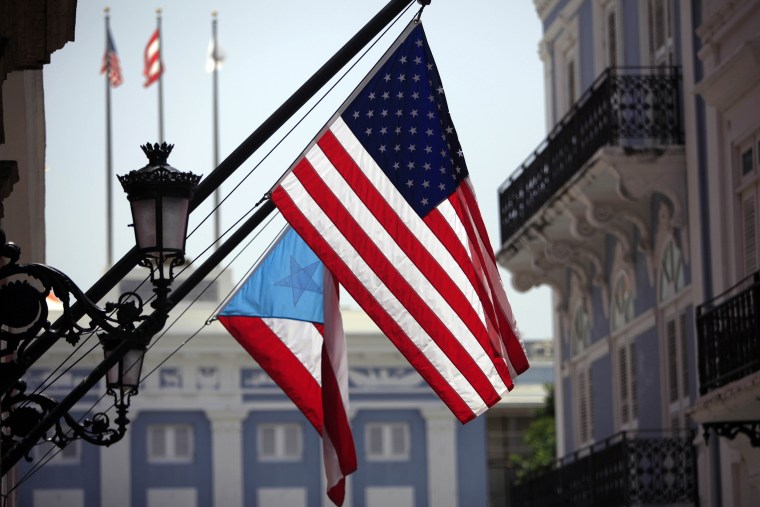Congress has passed laws defining Puerto Rico's territorial status based on racist, century-old Supreme Court decisions, which use terms such as "alien races” and “savage and restless people" and have "no place in United States Constitutional law," according to a bill by several lawmakers.
Rep. Raul Grijalva, D-Ariz., who leads the House committee that oversees the affairs of U.S. territories, is sponsoring a bipartisan resolution that would reject the Supreme Court rulings known as the Insular Cases and their use as legal precedent for current and future rulings on Puerto Rico or the other U.S. territories.
The Insular Cases were written by most of the Supreme Court justices who legalized racial segregation under Plessy v Ferguson after Puerto Rico came under U.S. control following the Spanish-American War.
One of the rulings stated that Puerto Rico "was owned by the United States," though "it was foreign to the United States in a domestic sense."
Charles Venator-Santiago, a political science professor at the University of Connecticut, said the rulings, written between 1901 and 1922, ended up giving Congress "the power to decide when the U.S. Constitution applies to the territories.”
For example, Congress granted U.S. citizenship to Puerto Ricans in 1917, and Puerto Ricans can be drafted and serve in the U.S. military. But as a territory and not a state, Puerto Ricans in the island cannot vote in U.S. presidential elections or have members of Congress with voting power.
Constitutional scholars like Judge Juan Torruella have argued that the U.S. benefited from Puerto Rico's territorial status by imposing, for example, strict agricultural quotas that benefited large U.S. companies during decades of very profitable sugar production. At the same time, Congress imposed the century-old Jones Act, which significantly raises the cost of imported goods to the island by limiting foreign ships from going to Puerto Rico in order to allow more American-built vessels and crews to make shipments to the island.
Separate and unequal?
When Detroit needed to pay a debt of about $20 billion, the city was able to file for bankruptcy under the federal code.
But when Puerto Rico filed for the largest municipal bankruptcy in U.S. history, the U.S. territory wasn't allowed to restructure its debt under the federal bankruptcy code, since Congress left the island out of the law in 1984.
Instead, Congress passed a new law called Promesa and created a federally-appointed financial oversight board to monitor the island’s finances and negotiate with creditors owed $120 billion in bond and pension debt.
“Promesa relies too heavily on austerity measures falling on the backs of ordinary Puerto Ricans,” Grijalva said at a recent congressional hearing.
Grijalva and the other lawmakers supporting his resolution have pointed that in a current federal lawsuit that questions the way Congress chose the financial oversight board's members, those defending the board may point to the Insular Cases to defend Congress' role.
U.S. territories, Venator-Santiago said, "are usually foreign for domestic purposes, and a state for international purposes." He points to the funding of public programs as an example.
Unlike the 50 states — where Medicaid funding is open ended — Puerto Rico gets a limited spending cap, essentially a block grant, and the island has to pick up the rest of the costs.
Even though the poverty rate in Puerto Rico is more than two times higher than in Mississippi, the nation’s poorest state, the federal government covers 55 cents of every dollar spent by Puerto Rico on Medicaid compared to 76 cents in Mississippi. In the 2019 fiscal year, the island's Medicaid funding was capped at $367 million, while Medicaid expenditures totaled $2.7 billion.
More recently, lawmakers such as Grijalva, Reps. Nydia Velázquez, D-N.Y., and Darren Soto, D-Fla., have pointed out the inequality in funding for Puerto Rico as it recovers from Hurricane Maria — the deadliest natural disaster for the U.S. in 100 years.
For instance, the Federal Emergency Management Agency denied assistance to rebuild homes to hundreds of thousands of Puerto Ricans mainly due to discrepancies between the agency’s application requirements and the island’s history of informal construction and housing development in poorer communities.
More recently, the U.S. Department of Housing and Urban Development made a decision to stall hurricane recovery funding for Puerto Rico. HUD kicked off a funding process for 17 states affected by disasters but left out Puerto Rico, citing "alleged corruption" and "fiscal irregularities" as well as “Puerto Rico's capacity to manage these funds."
Lawmakers and scholars who deem the Insular Cases unconstitutional state that while Plessy v Ferguson was overturned almost 60 years later in Brown v. Board of Education of Topeka, the Insular Cases have never been overturned.
Grijalva introduced his legislation with the support of Puerto Rican lawmakers such as Soto, Velázquez and Rep. Alexandria Ocasio-Cortez, D-N.Y., as well as four nonvoting members of Congress representing U.S. territories.
Reps. Jared Huffman, D-Calif., and Debra Haaland, D-N.M., are also co-sponsoring the resolution.
Follow NBC Latino on Facebook, Twitter and Instagram.



